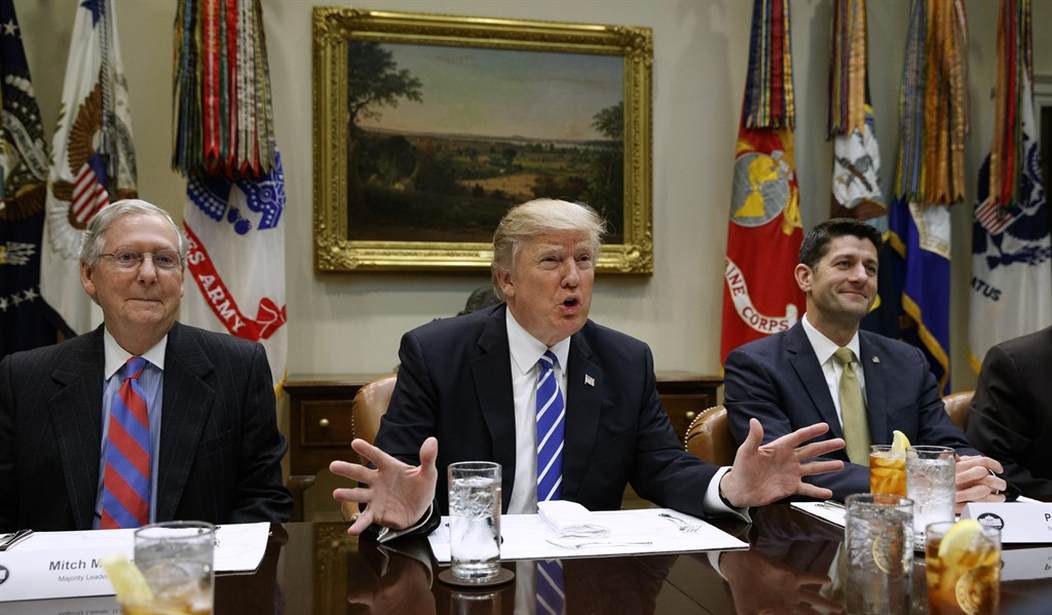Liberal writers and political operatives, now that it's finally dawning on them that no one is going to find evidence that Donald Trump conspired with Russia to steal the presidential election, are turning to giving advice to the Democratic Party.
That's a natural, if somewhat delayed, response to an election that left the world's oldest political party out of power in the three branches of the federal government. The margins of defeat may have been small, but the consequences seem deep and maybe long-lasting.
A consensus is arising that Democrats should rely less on identity politics and more on economic appeals. In retrospect, they over-relied on the theory that demographic change -- increasing percentages of nonwhite voters and single women -- would produce automatic victories.
Actually, this "ascendant America" netted Barack Obama only 51 percent of the vote in 2012, leaving little margin for error. And no other Democrat was likely to match the black turnout and Democratic percentages he inspired.
Another problem is that reliance on a coalition of minorities encourages a self-righteous mindset that dismisses everyone else as "deplorable." Hillary Clinton's resort to this label at a Manhattan fundraiser was not an accident.
The better course, say many Democrats -- from The Atlantic's Franklin Foer to the narrowly defeated candidate Jon Ossoff in Georgia's 6th Congressional District -- is to stress economics. They yearn to return to the days when the Democratic Party was the party of the union guy with a lunch pail, when blue-collar workers voted by a 2-1 margin for Democrats.
Recommended
Those days are actually long past. Republicans have been carrying white non-college graduates for 25 to 30 years, since long before Trump came onto the political scene. Trump's achievement, with his trade and immigration proposals, was to increase the margin with those voters significantly in states such as Pennsylvania, Michigan and Wisconsin by appealing to those raised in union households who had been sticking with the Democrats.
But what do Democrats have to offer on economics? Higher tax rates on high earners? Most voters like the idea but don't seem convinced that it would help people like them. Maybe increased revenues would reduce budget deficits or enable government to hire more bureaucrats or pay them more. But would that mean a better life for voters?
What about jacking up wages by increasing the minimum wage? Again, that polls really well, but it's a policy that wouldn't do much for most ordinary people. It could even hurt the intended beneficiaries; a University of Washington study showed that Seattle's sharply increased minimum wage has significantly reduced low-skilled workers' incomes because of a reduction in their hours.
The problem for Democrats is that the United States already has a progressive tax structure, more so than much of Europe, and already supplements low-wage work with the earned income tax credit. Marginal adjustments of these policies might help some people, but they wouldn't set the political world afire.
Meanwhile, promises of free college or free health care lack credibility. Negative ratings of Obamacare in the Obama years and current Republican repeal-and-replace proposals show an ingrained skepticism that government can provide improved services.
Voters may have noticed that government aid policies have coincided with above-inflation cost increases in higher education and health care. Political promises to spend more may not work with an electorate that fears that spending cuts might hurt but doubts that spending increases would help.
Historically, Democrats have championed countercyclical Keynesian spending to prevent or curtail recessions. But today we're at the opposite side of the business cycle, with low unemployment after an extended period of budget deficits and low interest rates. President Trump's job approval rating is higher on the economy than on almost any other issue.
It's true that economic growth has been lagging at a historic rate and that workforce participation, especially among non-college-educated men, has been deteriorating. But those were phenomena of the Obama years, which weakens Democrats' credibility in addressing them. However, the trends are deeper and longer-lasting, which means that Republicans don't have much credibility, either.
The fact is that both parties' traditional economic policy levers seem poorly adapted to repair today's economic weaknesses. Voters may just be zoning out when either Democrats or Republicans argue they can strengthen the economy.
If that's right, then elections most likely will continue to be fought out mainly on identity politics lines. Democratic economic appeals won't win over many blue-collar Christians in flyover country any more than Republican economic policies will win over many high-income coastal secularists.
The good news for both parties is that recent elections show that both sides can win. The bad news: Both can lose.

























Join the conversation as a VIP Member